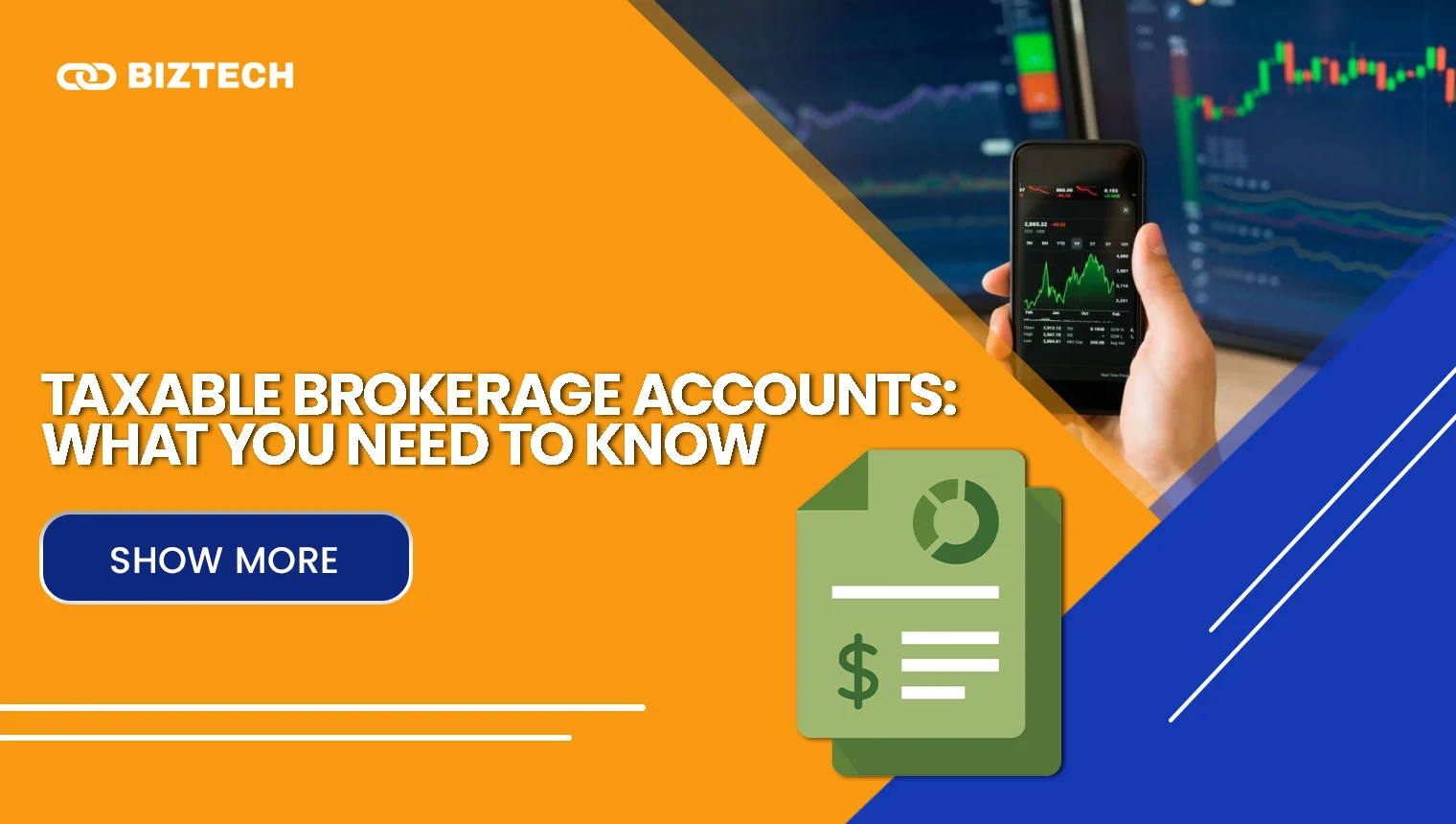For those venturing into the world of investing, understanding taxable brokerage accounts becomes crucial.
- Pros and Cons of Taxable Brokerage Account
- Tax Implications of Using a Taxable Brokerage Account
- Investing Strategies for Taxable Brokerage Accounts
- 1. Tax-Loss Harvesting
- 2. Investing in Tax-Advantaged Securities
- Who Should Consider a Taxable Brokerage Account
- 1. Short-Term Investment Goals
- 2. Diversification of Retirement Portfolio
- 3. Need for Liquidity
- 4. Estate Planning Considerations
- 5. Holding Significant Cash
- Choosing a Taxable Brokerage Account
- 1. Account Fees
- 2. Market Access and Investment Options
- 3. Research Tools and Educational Resources
- 4. Customer Support
- Setting Up a Taxable Brokerage Account
- Step 1: Select Your Taxable Brokerage Account Provider
- Step 2: Open Your Taxable Brokerage Account
- Step 3: Fund Your Account
- Step 4: Choose Your Preferred Investments
- Step 5: Rebalance Your Investments Regularly
- Conclusion
First, let us address what is a taxable brokerage account. A taxable brokerage account differs as it lacks favorable tax treatment. In retirement accounts, investments grow tax-deferred, with taxes payable only upon withdrawal in retirement.
Understanding taxable brokerage accounts is essential for several reasons. It empowers you to make informed investment decisions, considering both potential returns and tax implications. Knowing the distinction between taxable accounts and retirement accounts allows you to choose the right investment vehicle based on your financial goals and tax situation.
This introduction will equip you with the basicsin finding the best taxable brokerage account, highlighting why this knowledge is essential and how these taxable brokerage accounts differ from retirement vehicles.
[su_box title=”Key Takeaways” box_color=”#000877″ title_color=”#ffffff” radius=”6″]
- Taxable vs. Retirement: Taxable accounts offer flexibility but no tax breaks. Invest for control and potentially lower capital gains taxes, but expect annual intaxes.
- Taxable Account Pros: Easy fund access, lower capital gains taxes, tax-loss harvesting, no contribution limits, diverse investments, and inheritance benefits.
- Taxable Account Cons: Annual taxes on earnings and gains, no tax deductions on contributions, and potentially less asset protection.
- Tax Implications: Contributions are after-tax, short-term capital gains are taxed as income, while long-term gains are typically exempt.
- Tax-Saving Strategies: Utilize tax-loss harvesting and consider tax-advantaged options like municipal bonds.
- Who Should Use It: Investors with short-term goals, those diversifying retirement accounts, needing liquidity, with estate planning needs, or holding significant cash.
- Choosing a Brokerage: Consider fees, market access, investment options, research tools, and customer support.
[/su_box]
Pros and Cons of Taxable Brokerage Account
Taxable brokerage accounts offer several advantages, making them a valuable tool for investors. However, it’s essential to consider their drawbacks as well. Here’s an exploration of the pros and cons to help you make an informed decision:
Pros:
- Accessibility: One significant advantage of taxable brokerage accounts is their accessibility. Investors can withdraw funds at any time without facing penalties, providing flexibility for various financial needs or emergencies.
- Lower Tax Rates: Assets held within taxable brokerage accounts may qualify for lower capital gains tax rates compared to ordinary income tax rates. This favorable tax treatment can lead to potentially higher after-tax returns for investors.
- Tax-Loss Harvesting: Tax-loss harvesting is a strategy that involves selling securities at a loss to offset capital gains and reduce taxable income. In taxable brokerage accounts, investors can utilize this strategy to manage their tax liabilities efficiently, thereby enhancing overall portfolio returns.
- No Contribution Limits: Unlike retirement accounts such as IRAs or 401(k)s, taxable brokerage accounts have no contribution limits. Investors can deposit as much money as they desire in any given year, allowing for greater flexibility in saving and investing.
- Investment Selection: Taxable brokerage accounts offer a wide range of investment options. Investors can choose from various securities, including stocks, bonds, mutual funds, ETFs, and more, enabling them to tailor their portfolio to meet their financial goals and risk tolerance.
- Inheritance Benefits: Upon the death of the account holder, beneficiaries of taxable brokerage account assets can benefit from a step-up in the cost basis to the fair market value on the date of death. This can minimize the tax burden for heirs when they sell the inherited assets.
Cons:
- Annual Taxes: Unlike retirement accounts where investments grow tax-deferred, taxable brokerage accounts are subject to annual taxes on investment earnings and capital gains. Investors must report these taxable events each year, potentially increasing the complexity of tax filing and reducing net returns.
- No Tax Deduction: Contributions made to taxable brokerage accounts are not tax-deductible. Unlike contributions to retirement accounts, which may be eligible for tax deductions, investors cannot reduce their taxable income by contributing to a taxable brokerage account.
- Lack of Legal Protection: Unlike retirement assets, which are often protected from creditors under certain circumstances, assets held in taxable brokerage accounts may not enjoy the same level of legal protection. This means that in the event of bankruptcy or litigation, these assets could be vulnerable to seizure by creditors.
Tax Implications of Using a Taxable Brokerage Account
- Taxes on Contributions:
Unlike contributions to retirement accounts which may be tax-deductible, contributions to a taxable brokerage account are made with after-tax dollars. This means you don’t receive an upfront tax benefit for the money you invest.
- Taxes on Earnings:
- Capital Gains Taxes: Explain the difference between short-term (held less than 1 year) and long-term (held more than 1 year) capital gains tax rates.
- Short-Term Capital Gains: These apply to assets held for less than one year. They are taxed at your marginal income tax rate.
- Long-Term Capital Gains: These apply to assets held for more than one year. The good news for investors is that long-term capital gains are generally exempt from taxation, which incentivizes long-term investment strategies.
- Dividends and Interest: Earnings within the account, such as dividends from stocks or interest from bonds, are also subject to taxation, albeit with varying treatment.
- Interest: Interest earned on investments within the taxable account is usually taxed as income at the investor’s marginal income tax rate.
Investing Strategies for Taxable Brokerage Accounts
Taxable brokerage accounts provide investors with a potent tool to wield flexibility and autonomy over their investments. Nonetheless, effectively navigating the associated tax implications demands a strategic approach.
Here, we delve into two pivotal strategies aimed at optimizing returns while mitigating tax burdens:
1. Tax-Loss Harvesting
This tactic entails purposefully selling investments at a loss to counterbalance capital gains and potentially diminish the overall tax obligation. Here’s a breakdown of its mechanics:
Identify Underperforming Investments: Regularly assess your portfolio to pinpoint any assets that have depreciated in value.
Strategic Liquidation: Sell these underperforming investments to realize the loss on paper. The resulting loss can then be utilized to offset capital gains stemming from other investments in the account, thereby potentially lowering your taxable income.
Repurchase Consideration: Post-sale, contemplate repurchasing similar assets (while steering clear of identical ones to sidestep wash-sale regulations) to maintain your desired portfolio allocation. This enables you to capitalize on prospective future growth while capitalizing on the tax advantages afforded by the loss.
2. Investing in Tax-Advantaged Securities
Although taxable brokerage accounts do not grant tax-deductible contributions, integrating tax-advantaged securities into your portfolio can curtail your tax liability.
One such avenue is:
Municipal Bonds: Issued by state and local governments, municipal bonds offer interest income that may be exempt from federal income tax and potentially from state and local income taxes as well, contingent upon the bond’s jurisdiction.
This tax exemption can significantly enhance the overall return on investment within your taxable brokerage account.
Who Should Consider a Taxable Brokerage Account
While tax-advantaged accounts are typically favored for long-term retirement savings, there are scenarios where a taxable brokerage account might offer superior advantages.
Here are instances where opting for a taxable brokerage account could be advantageous:
1. Short-Term Investment Goals
If you’re targeting short-term financial objectives, like accumulating funds for a home down payment or purchasing a vehicle, a taxable brokerage account could be an ideal choice.
Its absence of penalties for early withdrawals grants investors greater flexibility in accessing their funds without constraints.
2. Diversification of Retirement Portfolio
Seeking to diversify your retirement portfolio?
Utilizing a taxable brokerage account can offer a solution. Taxable brokerage accounts are not subject to contribution limits, allowing for enhanced diversification opportunities.
3. Need for Liquidity
Requiring immediate access to funds? A taxable brokerage account could be advantageous.
Unlike tax-advantaged retirement accounts, taxable brokerage accounts do not limit the timing or amount of withdrawals, providing investors with unrestricted liquidity.
4. Estate Planning Considerations
Investors concerned about estate planning might find a taxable brokerage account beneficial.
Unlike tax-advantaged retirement accounts that mandate required minimum distributions (RMDs) after a certain age, taxable brokerage accounts can be passed down to heirs without RMD obligations, making them an appealing option for estate planning purposes.
5. Holding Significant Cash
If you find yourself holding a substantial amount of cash in a savings account, a taxable brokerage account could offer opportunities for potentially higher returns through a wider array of investment options.
Choosing a Taxable Brokerage Account
There may be others out there who are curious about how to open the best taxable brokerage account and the factors involved in selecting the right brokerage, but perhaps they have not had the chance to inquire about it yet.
That is why I have put together this quick and straightforward guide on how to open a brokerage account for those who could use a bit of guidance.
But let us start at the beginning — before diving into opening a brokerage account, the first step is to choose your next best taxable brokerage account firm.
However, subtle distinctions (such as the trading platform’s ease of use, the level of customer support, etc.) could sway your preference towards one brokerage over another.
1. Account Fees
Understanding the fee structure of brokerage firms is crucial. Keep an eye out for:
- Commissions: Fees levied per trade, typically applicable to buying or selling individual stocks or options.
- Trading Fees: These may encompass platform charges or per-trade fees for specific asset classes like ETFs or mutual funds.
- Account Maintenance Fees: Some brokers impose annual or monthly charges for maintaining your account.
Among the preferred low-cost brokerages among local investors are Interactive Brokers, Fidelity Investments, Vanguard, Trading 212.
2. Market Access and Investment Options
Global Market Access:
- Do you want to trade stocks listed in foreign markets? Ensure your chosen broker provides access to the exchanges you’re interested in, for example, DAX, Nikkei, London Stock Exchange, Shenzhen Stock Exchange and more.
- Foreign custody fees: Remember, foreign shares are typically held in a nominee account with your broker, often incurring monthly fees per stock. For frequent overseas investing, consider a foreign brokerage for potentially lower fees.
Cost-Effective Trading:
- For US markets: Consider a US brokerage like Interactive Brokers (known for low commissions) to potentially save on trading costs.
Brokerage Options Beyond Stocks:
- Look beyond stocks: Many brokers offer access to a wider range of products, such as ETFs, bonds, options, etc.
- Focus on what you understand: If you’re new to investing, stick to familiar products like stocks, bonds, and certain ETFs until you gain more knowledge about complex options.
3. Research Tools and Educational Resources
Beyond account fees and investment options, consider the importance of research tools and educational resources offered by your chosen brokerage.
These can significantly enhance your investment experience, especially for active traders or those seeking to expand their knowledge.
User-Friendly Trading Platform:
- Online and Mobile Accessibility: Do you prefer online or mobile trading? Ensure the platform is user-friendly and accessible on your preferred devices.
- Research Capabilities: Look for features like price charts, technical indicators, and fundamental data analysis tools – essential for informed investment decisions.
Investing Education:
- Demo Platforms: Many brokerages offer demo accounts allowing you to test-drive their platform before committing real capital. This helps you familiarize yourself with the interface and avoid costly mistakes.
- Learning Resources: Does the platform offer educational materials like tutorials, webinars, or market commentaries? These resources can equip you with the knowledge and confidence to navigate the investment landscape.
By prioritizing user-friendly platforms, robust research tools, and access to educational resources, you empower yourself to make informed investment decisions within your taxable brokerage account.
4. Customer Support
Accessible and dependable customer support is essential. Ensure:
- Timely Assistance: Verify the availability of customer support channels to address queries or concerns promptly.
By meticulously evaluating these factors, you can identify a taxable brokerage account that suits your investment objectives, budget, and service preferences.
Remember to compare fees, investment options, and resources across different firms before making a final decision.
Setting Up a Taxable Brokerage Account
Here is a guide on how to open a taxable brokerage account:
Step 1: Select Your Taxable Brokerage Account Provider
Begin by choosing a brokerage firm where you will open your taxable brokerage account.
Consider factors such as the range of investment options available, account minimum requirements, and any associated fees.
Step 2: Open Your Taxable Brokerage Account
Most brokerage firms offer the option to open a taxable brokerage account online in two ways:
(a) To open an account online:
Just download and complete the application form, attach the required supporting documents, and send it to the brokerage’s designated mailing address.
Alternatively, if the brokerage provides an online opening feature, you can directly open an account through their website.
(b) Visit the Office:
If you find paperwork cumbersome or are uncertain about form completion, consider visiting the office of your chosen brokerage. There, a representative can guide you
Step 3: Fund Your Account
Once your account is open, you need to deposit funds into it. The most convenient method is usually an electronic transfer from your bank account.
Be mindful of any potential fees associated with different transfer methods; while electronic funds transfers (EFT) are often free, some firms may charge for bank wires, albeit faster.
Step 4: Choose Your Preferred Investments
Selecting investments for your taxable brokerage account can be challenging. If you’re uncertain, consider starting with a broad-based index ETF, such as an S&P 500 or Nasdaq composite index fund.
These options provide diversified exposure to the market and can serve as a solid foundation for your portfolio.
Step 5: Rebalance Your Investments Regularly
It is essential to review and rebalance your investments periodically, ideally at least once a year. This ensures that your portfolio remains aligned with your target asset allocation and investment objectives.
Conclusion
Taxable brokerage accounts present an appealing choice for numerous investors, offering flexibility, control, and the prospect of reduced tax obligations through strategic investment. However, grasping the tax ramifications and selecting the appropriate and best taxable brokerage account is paramount. It’s advisable to seek guidance from a financial advisor to receive tailored investment advice suited to your individual circumstances.
Disclaimer: The content provided in this article serves for informational purposes exclusively and should not be construed as financial advice. Investing in AI ETFs carries inherent risks, and previous performance does not guarantee future outcomes. Prior to making any investment choices, it’s advisable to seek guidance from a certified financial advisor who can take into account your unique financial circumstances and risk tolerance. We are not financial experts, and nothing presented here should be interpreted as a suggestion to purchase or sell any security.






